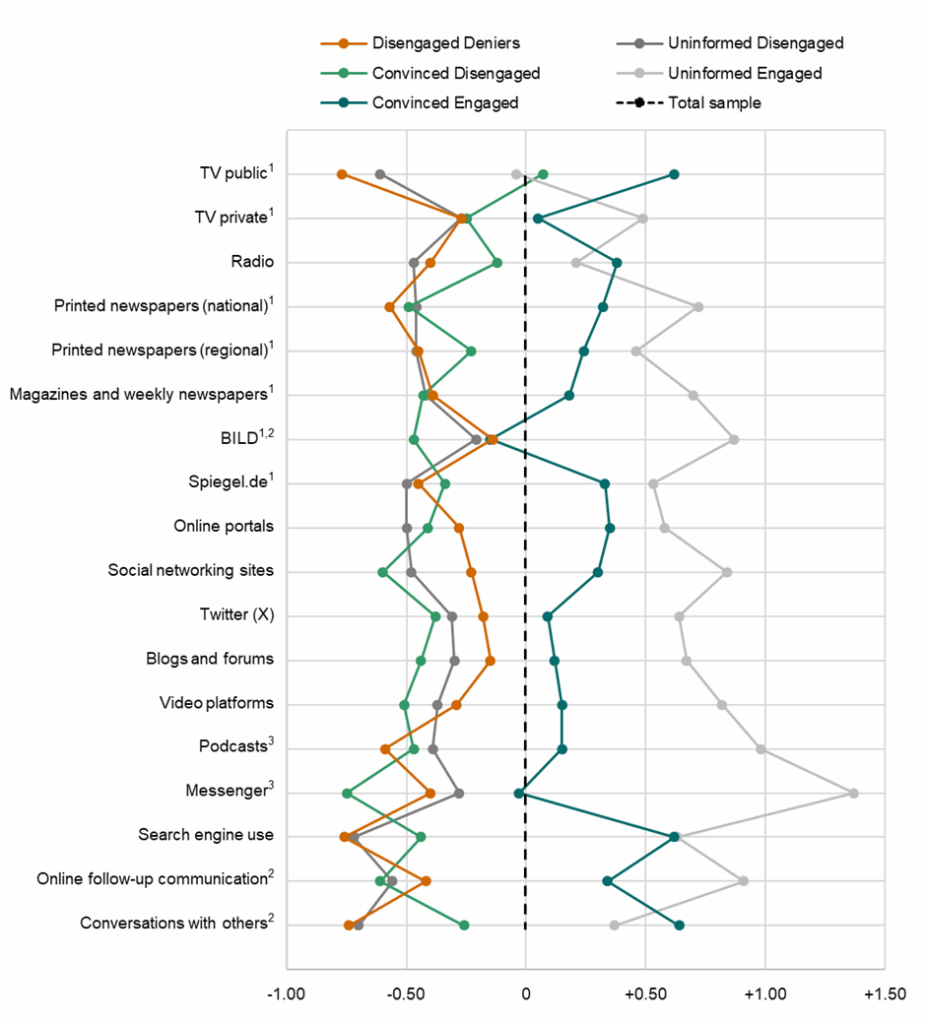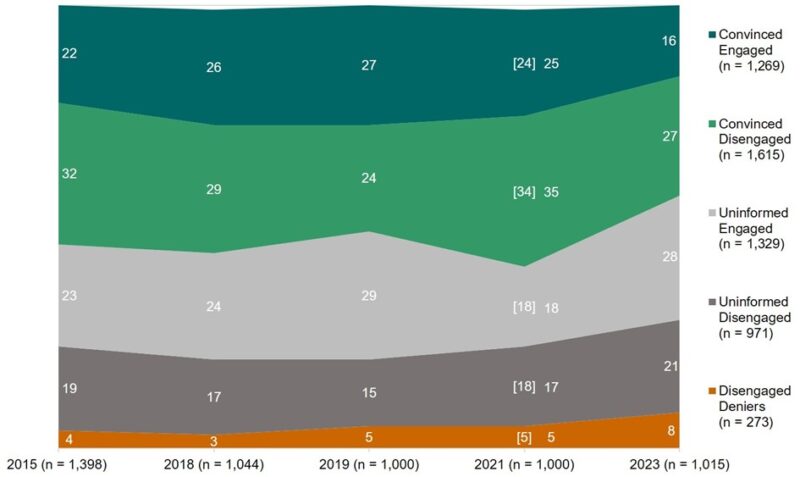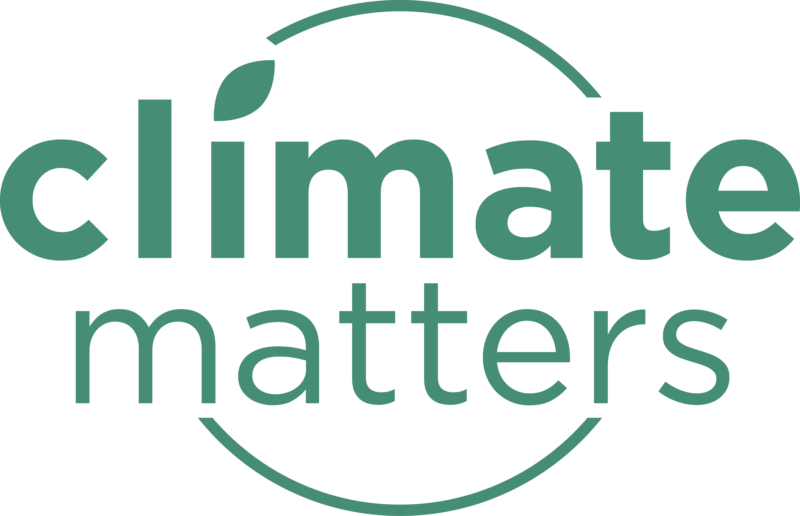The Paris Agreement and worldwide climate protests in 2018/19 seemed to signal the beginning of a fundamental societal transformation. However, recent developments in public engagement with climate issues in Germany, a traditionally climate-aware country, call this into question.
In our “Study of the Month” series, we highlight recent research relevant to climate communication and social media studies. This month, we feature another newly published paper from our own research group:
Reif, A., Guenther, L., & Brüggemann, M. (2025). Unveiling the Backlash in Public Opinion on Climate Change: A Longitudinal Study of Climate Change-Related Population Segments and Communicative Engagement in Germany. Environmental Communication, 1–23. https://doi.org/10.1080/17524032.2025.2507006
Changes in public opinion on climate change in Germany
Previous research found that Germany is a country with consistently high levels of climate change awareness and concern among the public. Furthermore, unlike the situation in the United States, it seems that climate change denial has not been a significant issue in Germany in the past.
However, recent developments related to climate policy—such as the voting results for the AfD or critical media coverage of the previous government’s climate policies—raise the question of whether public opinion on climate change has shifted, at least among certain segments of the population.
To tackle this question, we conducted recurring surveys to examine population segments in Germany over time with respect to their factual knowledge about climate policy, climate change beliefs, personal and collective efficacy, and political engagement.
Role of differentiated media use and communicative engagement
Previous research often overlooks the activistic potential of people’s communicative engagement with climate change that extends beyond issue-specific news media consumption, including social media use and follow-up communication. We aimed to advance methods and deepen insights into these differentiated communication practices.
Methods
- Recurring surveys conducted in Germany during UN climate summits in 2015 (n =1477), 2018 (n = 1044), 2019 (n = 1000), 2021 (n = 1000), and 2023 (n =1015)
- Application of latent profile analysis to identify population segments
regarding climate change-related perceptions and behavioural engagement - Mean comparisons between the groups regarding perceptions and behavioural engagement, as well as analyses of variance to compare their communicative engagement
- Analyses of the development of the segments’ frequencies (Chi² Test) and their perceptions, behaviours, and communicative engagement over time
Key results
Identification of deniers among five population segments
Our study identified five distinct population segments, differentiated based on their perceptions of climate change. These segments differed notably in their climate change beliefs, factual knowledge, and climate-related political engagement. Two groups exhibited particularly strong belief in climate change: One was politically engaged (Convinced Engaged, 23% of the total sample), and the other was disengaged (Convinced Disengaged, 30%).
Two additional groups held moderate beliefs about the existence of anthropogenic climate change but had significant knowledge gaps. Again, one was politically engaged (Uninformed Engaged, 24%), and the other was disengaged (Uninformed Disengaged, 18%).
For the first time in Germany, our study also identified a small, distinct group of climate change deniers (Disengaged Deniers, 5%).
Identification of interesting communicative patterns and developments
We observed a general trend that concern about climate change correlated positively with communicative engagement, though this varied across segments. Going beyond previous research, our approach identified a Convinced Engaged group that could be termed the “climate avant-garde”—they show strong support for climate policies, frequently receive information from public TV, and actively communicate with family and colleagues (see Figure 1).
Conversely, it identified a youthful Uninformed Engaged group that stands out for their heavy use of media—particularly online and entertainment media. Despite low factual knowledge, they exhibit the second-highest level of climate-friendly behaviour.

Figure 1. Population segments’ deviations from overall mean regarding climate change-related communicative engagement, by media channel. Found on page 11 of article.
Note. n = 5,457. 1 not measured in 2015, 2 index of two or more items calculated using the maximum, 3 only measured in 2021 and 2023. BILD combines the printed and online version of the German tabloid newspaper BILD, Spiegel.de is the news website of the German weekly news magazine Der Spiegel.
Peak of climate-friendly perceptions and communicative engagement in 2019
In 2019, the proportions of individuals in both ‘engaged’ groups reached their highest levels during the study period, coinciding with a peak in communicative engagement. Furthermore, the trend observed that members of these groups talked more frequently about climate change and used a wide range of media sources—was especially pronounced at this time.
Recent decline in climate-friendly perceptions and doubling of deniers
By 2023, the proportions of the convinced groups had decreased, while all other groups saw an increase compared to 2015. This indicates that the share of uninformed individuals and those less convinced of anthropogenic climate change has grown in recent years. Although the subgroup of Disengaged Deniers remains small, its size has doubled since 2015—rising from 4% to 8% in the latest wave (see Figure 2; or page 12 in article).
This trend is reflected in the fact that, on average, perceptions in 2023 were less climate-friendly than in 2021, with some being even less supportive than in 2015. Additionally, people appear to be more hesitant to discuss climate change with others.

Note. For 2021, numbers in square parentheses indicate percentages weighted for education, χ2(5,457)=131.47; df=16; p<.001; w=.15 (see Supplemental Table 2 for details).
Conclusion
The increased concern and communicative engagement observed in 2019 may be attributed to the “Greta Thunberg Effect.” The contrasting findings from the most recent survey wave (December 2023) are also noteworthy, with the increase in climate change deniers in particular, suggesting a possible backlash for climate protection and underscoring the need for further longitudinal research.
These results may indicate emerging climate change fatigue or frustration with current climate policies, accompanied by a decline in issue-specific media consumption and discussions with friends and family. They also emphasize the importance of analyzing the complex relationship between attitudes, behaviours, and various communication practices.
